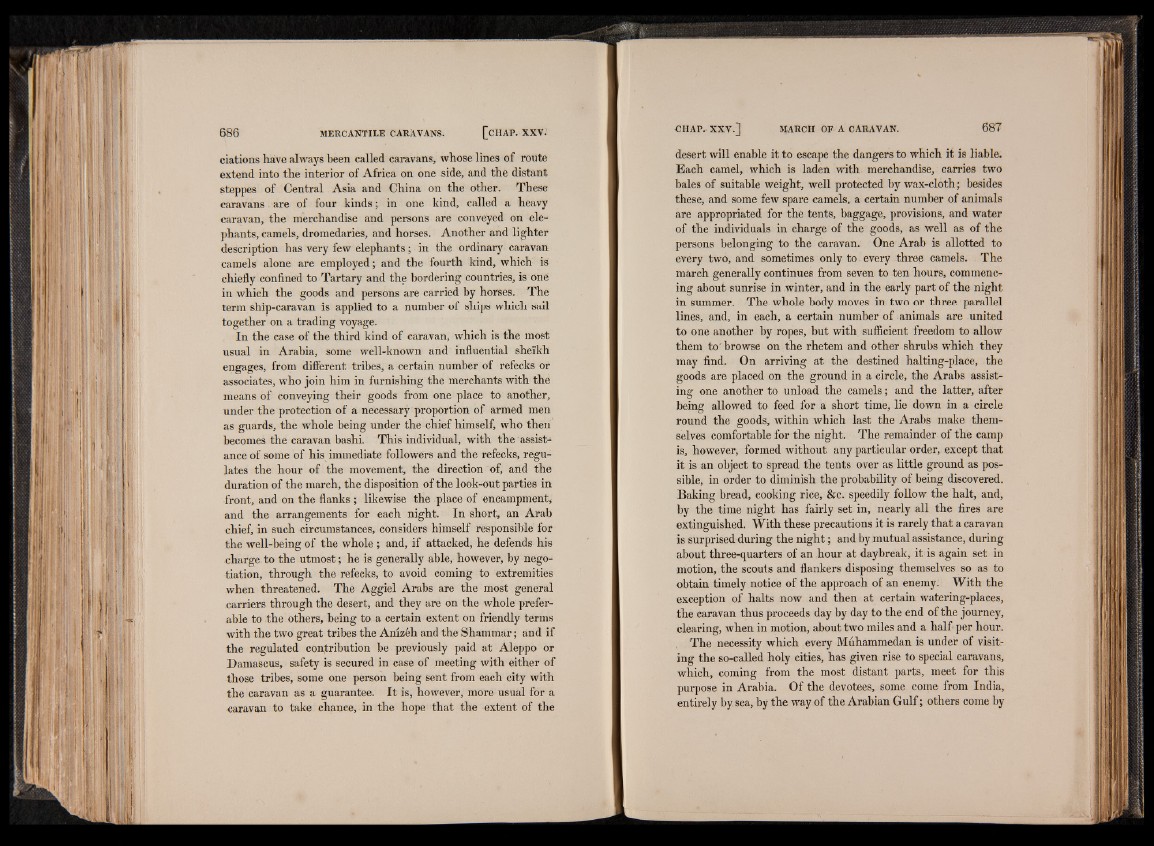
ciations have always been called caravans, whose lines of route
extend into the interior of Africa on one side, and the distant
steppes of Central Asia and China on the other. These
caravans. are of four kinds; in one kind, called a heavy
caravan, the merchandise and persons are conveyed on elephants,
camels, dromedaries, and horses. Another and lighter
description has very few elephants; in the ordinary caravan
camels alone are employed; and the fourth kind, which is
chiefly confined to Tartary and the bordering countries, is one
in which the goods and persons are carried by horses. The
term ship-caravan is applied to a number of ships which sail
together on a trading voyage.
In the case of the third kind of caravan, which is the most
usual in Arabia, some well-known and influential sheikh
engages, from different tribes, a certain number of refecks or
associates, who join him in furnishing the merchants with the
means of conveying their goods from one place to another,
under the protection of a necessary proportion of armed men
as guards, the whole being under the chief himself, who then
becomes the caravan bashi. This individual, with the assistance
of some of his immediate followers and the refecks, regulates
the hour of the movement, the direction of, and the
duration of the march, the disposition of the look-out parties in
front, and on the flanks ; likewise the place of encampment;
and the arrangements for each night. In short, an Arab
chief, in such circumstances, considers himself responsible for
the well-being of the whole ; and, if attacked, he defends his
charge to the utmost; he is generally able, however, by negotiation,
through the refecks, to avoid coming to extremities
when threatened. The Aggiel Arabs are the most general
carriers through the desert, and they are on the whole preferable
to the others, being to a certain extent on friendly terms
with the two great tribes the Anizeh and the Shammar; and if
the regulated contribution be previously paid at Aleppo or
Damascus, safety is secured in case of meeting with either of
those tribes, some one person being sent from each city with
the caravan as a guarantee. It is, however, more usual for a
caravan to take chance, in the hope that the extent of the
desert will enable it to escape the dangers to which it is liable.
Each camel, which is laden With merchandise, carries two
bales of suitable weight, well protected by wax-cloth; besides
these, and some few spare camels, a certain number of animals
are appropriated for thé tents, baggage, provisions, and water
of the individuals in charge of the goods, as well as of the
persons belonging to the caravan. One Arab is allotted to
every two, and sometimes only to every three camels. The
march generally continues from seven to ten hours, commencing
about sunrise in winter, and in the early part of the night
in summer. The whole body moves in two or three parallel
lines, and, in each, a certain number of animals are united
to one another by ropes, but with sufficient freedom to allow
them to'browse on the rhetem and other shrubs which they
may find. On arriving at the destined halting-place, the
goods are placed on the ground in a circle, the Arabs assisting
one another to unload the camels ; and the latter, after
being allowed to feed for a short time, lie down in a circle
round the goods, within which last the Arabs make themselves
comfortable for the night. The remainder of the camp
is, however, formed without any particular order, except that
it is an object to spread the tents over as little ground as possible,
in order to diminish the probability of being discovered.
Baking bread, cooking rice, &c. speedily follow the halt, and,
by the time night has fairly set in, nearly all the fires are
extinguished. With these precautions it is rarely that a caravan
is surprised during the night ; and by mutual assistance, during
about three-quarters of an hour at daybreak, it is again set in
motion, the scouts and flankers disposing themselves so as to
obtain timely notice of the approach of an enemy. With the
exception of halts now and then at certain watering-places,
the caravan thus proceeds day by day to the end of the journey,
clearing, when in motion, about two miles and a half per hour.
The necessity which every Muhammedan is under of visiting
the so-called holy cities, has given rise to special caravans,
which, coming from the most distant parts, meet for this
purpose in Arabia. Of the devotees, some come from India,
entirely by sea, by the way of the Arabian Gulf ; others come by